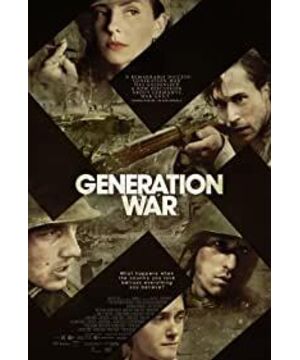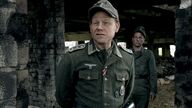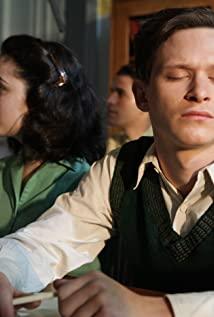Judging from the documentary film, "Our Fathers" is undoubtedly adapted from real characters' experiences. Except for the two who died in the war, the three surviving three protagonists in the film all lived to the time of the TV series. TV dramas use stories to reflect on war, while in documentaries, these people directly use language to ignore history. From the TV series, we can feel the pain of ordinary German people in the war, and this pain will accompany them all their lives; and in the interviews, we can see the deep reflection of the Germans, and this kind of reflection has remained until half a century after the war. haunts the heart of every German.
The five protagonists in the movie were in their youth when the war began. They have sweet expectations for life and good expectations for the future. Little did they know that when the war broke out, their lives had already been changed, they were destined to live in the chaos of war, they were destined to pay the price for this war with blood and even their lives, and their lives were destined to be branded by this war. Painful marks. In the words of "Documentary", their life is "the life written by history". Five protagonists, three men and two women, a pair of brothers, a couple, and a naive girl. They are all good friends. Except for one of the Jews who vaguely sensed a not-so-good future, the other four were full of enthusiasm and eager to serve their motherland. They had no doubts about Hitler, and they had great confidence in Germany's victory.
With patriotic enthusiasm and the belief of victory, the brothers joined the army and went to the Eastern Front. The innocent girl also went to the field hospital on the Eastern Front as a nurse. Only the couple stayed in Berlin. The brutality of the war soon shattered their rose-colored dreams. As the film says at the end: "Our fathers, they were all young and had a bright future, but at that time, the whole world fell into chaos." In this cruel war, go to the battlefield The three of them and the two who stayed behind all went through hardships. One of the brothers died on the battlefield, and the girl left behind was shot by the Nazis. Another Jew also survived the concentration camp after going through all kinds of hardships. The war changed their lives and made the survivors rethink Germany and the war.
The inhuman war provoked by Germany is often blamed on Hitler and the Nazis. This is also the best scapegoat for ordinary Germans. After all, they are indeed the culprits, and they have also brought serious consequences to Germany. disaster. However, the post-war Germans took on the responsibility of atonement and deeply reflected on the disaster Germany caused to the world during World War II. Of course, they also go through painful repetitions. First, they resisted, believing that the Nazi leaders were the criminals of the Nuremberg trial only because of the failure of the war; then, they felt wronged, thinking that Germany suffered heavy losses before the war, and the Germans were also victims of the war, and the Germans should not Atonement for the crimes of the Nazis. After the 1960s, the questioning of the Holocaust by a new generation of Germans made the whole of Germany begin to reflect and begin their journey of redemption.
At the Polish Jewish Martyrs Monument, Prime Minister Brandt's shocking kneeling was a turning point. The world has seen the Germans' repentance and their deep and heavy reflections, and Germany has regained the respect of the world.
The Germans themselves, from their reflections on World War II, have clearly understood the flaws deeply hidden in German culture, and have also become more aware of their own weaknesses in human nature. Such introspection gave the Germans the power to change their minds and return them to the civilized world. They not only reflect in their thoughts and words, but also keep in mind the reality. They have built many monuments and memorials to the disaster of World War II in Germany, and the new generation knows this catastrophic history; they have been paying war reparations to the countries they invaded since the war, which has reached hundreds of billions of dollars ; To those individuals who were harmed by the frenzied actions of Nazi Germany, the German government has also given them various financial aids as an apology.
Until now, nearly seventy years after the war, Germany is still reflecting. How can such a rational nation in Germany have national madness? How can this country that produced Goethe, Hegel and Bach despise the value of human nature? How could this country, which once brought such spiritual products to the world, bring such a catastrophe to mankind? In Germany, there have always been literary works, film and television, etc., reflecting on this humiliating history of Germany. The TV series "Our Fathers" is one of them. In this TV series based on real events, the reflection on Germany's behavior at the time is quite profound.
From the documentary, we can see that the TV series itself is very faithful to reality. Many of the plots we have seen from the TV series are actually well-documented, from the description of the prototype, and some are even taken from the time. 's video. The director of the TV series and the characters in the play reflect with the audience, reflecting on why Hitler launched such a war that was doomed to fail, reflecting on the pain caused by the war to the people of the invaded countries, and reflecting on the price paid by the German people in this war. Reflecting on the justice of various actions in the war, and reflecting on the dehumanizing behavior of the Nazis against the Jews. There are two things worth saying about the Eastern Battlefield, and both are mentioned on the show. The first was the Babinya massacre in Ukraine, where more than 30,000 Jews were killed and thrown into the death pit. In the documentary, it is also specifically mentioned that this appalling massacre was not just carried out by the SS, but also by the Wehrmacht. The other is that the Germans once ordered that all captured Soviet political commissars should be shot. But at the time of its execution, it was questioned by the German army, and it was later forced to cancel.
The prototype character in the play said in the documentary, "If you witnessed how he was executed, it would be impossible for people to feel nothing, otherwise they would only be regarded as beasts. All this is unacceptable." Some participants were lost in thought. "You become more and more brutal, and at the end we walk on the corpse without even looking at it. Our hearts are all armored and show no emotion." "When I was in the Soviet Union, I started to think, this is Arrogance, everything we do now, is wrong. We should be proud of our nation, this feeling is gone." These German soldiers who participated in the battle with the Soviet Union began to question the war and reflect on human nature . This reflection has continued to this day. And this kind of reflection is also an important reason for Germany to be respected by the world.
On the other hand, Japan, which was also a defeated country in World War II, showed a different situation after the war. Until now, this nation, which once brought serious disaster to the whole of Asia, has never sincerely apologized. On the contrary, they just talk about their pain at any time, claiming that they are the biggest victims of the war. From post-war Japanese literature and even film and television, few reflect on that period of history. They put their perspective more on the cruelty of nuclear explosions, and more of them show that the Japanese were caused by the war and the nuclear explosions. The flesh is split. Japanese writers and filmmakers seem to shy away from this history, a history so important to Japan as it is to Asia.
The same is true of the film master Yasujiro Ozu. Ozu, who participated in this war and sprayed poison gas in the rice fields in China, always avoids talking about this history. Among the many influential films he made after the war, it seems that The war never happened, it just showed the kindness and peace of the Japanese, and the beauty of Japan. Even in his autobiography, he passed by in a very indifferent tone. His post-war films seem to be just to explain to the world, take a look, the Japanese are so peace-loving, so forbearance and humility, how could they start a war, how could they do such a barbaric thing? His behavior is actually consistent with the practice in Japan as a whole.
They always deny their own barbarism in the war, and until now they still believe that Japan's actions at that time were for the liberation of Asia, and questioned the justice of the trial of Japanese war criminals. The war criminals can still enjoy the incense offered by their citizens. Hard to imagine. This only emphasizes the uniqueness of one's own culture, that he is also a victim, that he is unwilling to face his own history, that he is unwilling to bear his own historical responsibility, and that he is unwilling to repent of his past actions. How can we gain understanding and tolerance from neighboring countries, and how can we gain the respect of the world?
Not long ago, I saw a Japanese film called "I Want to Be a Shell", which is a rare film reflecting the history of World War II. The film reflects on the war from the perspective of an ordinary Japanese who participated in the war and was executed as a war criminal. It is a pity that, like other Japanese films, this kind of reflection only stands on its own position, expressing the pain caused by the war to the Japanese, expressing the injustice suffered by the Japanese after the war, and expressing the Japanese in the war. All kinds of helplessness, full of great grievance and puzzlement, and never mention the harm that his actions have caused to others. Yes, the Shimizu Toyomatsu family in the play is the same as the Germans in "Our Fathers". The war changed the trajectory of their lives. It was unfortunate that they lived in that war. It is a pity that they did not appear to be as reflective and repentant as the Germans, and still moved forward with historical grievances.
The Japanese were indeed written by war, but they refused to rewrite history with atonement. Therefore, this history, which they carelessly ignored, will always haunt them. That is a knot in the heart that cannot be circumvented, and a history that cannot be given up.
View more about Generation War reviews











